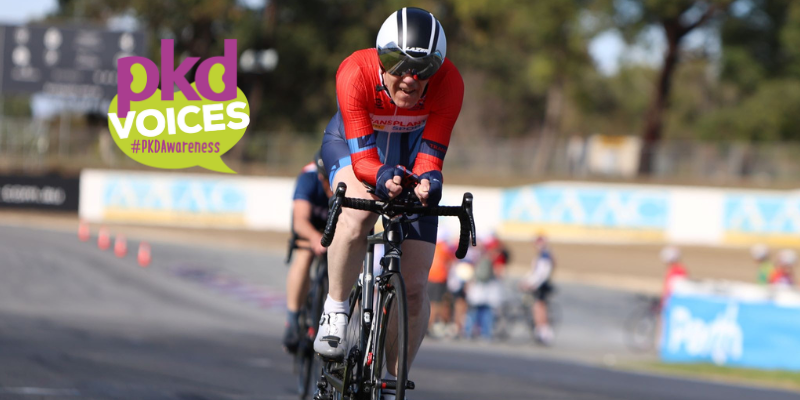
Michael's story
On top of the world from taking gold down under at the World Transplant Games in Australia, 60-year-old Michael from Oxford shares some of his PKD journey!
"It was hard to ignore PKD in my family, as both my father and aunt had it and underwent successful kidney transplants before I had mine. When I was diagnosed in my late 30s, I took comfort from the fact that it was a late-onset disease and for a while, I pretty much buried my head in the sand and ignored it, the only reminders being regular hospital check-ups.
But a very unflattering holiday snap persuaded me that I should do something to lose some weight. So, I got back on my bike. Having competed at a high level in my teens and twenties, I knew this was the best option to shed the pounds and improve my fitness. And over a period of a year or so, I did manage to make a difference.
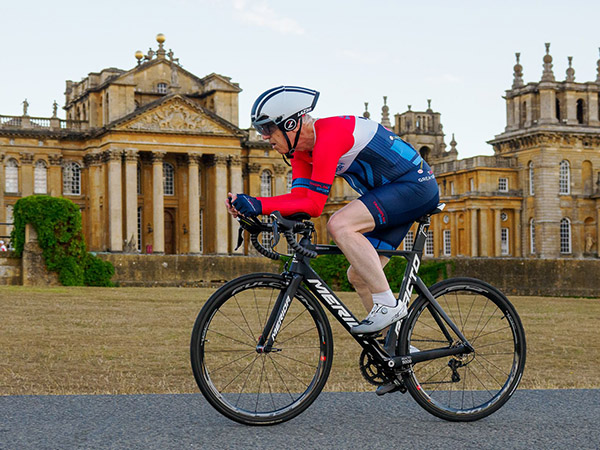
Race fit!
It also dawned on me that if what the consultant said was true and I would need a transplant in the future (surely not!), being in better shape would aid my recovery.
It was still a shock when my consultant said that the time had come and preparations for dialysis were set in motion. After fifteen months of nightly peritoneal dialysis using a machine next to my bed at home, I got the call in the middle of the night from the Churchill Hospital in Oxford to say they had a kidney for me. Despite advice from transplant staff, I had stubbornly refused to pack a bag just in case ‘the call’ came. However, that very day I was due to go into hospital to have a hernia operation, so there was a packed bag waiting by the door. Karma, fate – you tell me!
The hernia op was set aside and the transplant went well, thankfully.
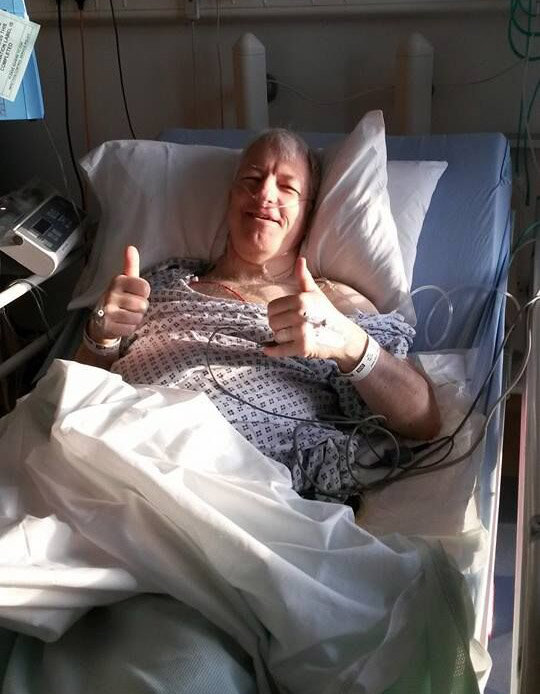
A very grateful Michael post-transplant
I wouldn’t describe myself as a driven person but in order to motivate myself to exercise, I have to have a goal. It’s not enough just to know it is good for me! Before my transplant, I’d met a former rider friend of mine who had said that I should think about taking part in the British Transplant Games so, as soon as I could get up out of bed, that became my target. Laps of my room developed into lengths of the ward corridor and, within a few days, I was home and thinking about getting back on the bike.
I was persuaded to slow things down a bit, which was good advice but around three months after my operation, I began riding again, gradually increasing the pace.
Sixteen months post-transplant, I was on the start-line for the cycling events at the 2016 British Transplant Games in Liverpool and was amazed and delighted to come away with silver and gold medals in my age group.
This started a cascade of opportunities, and I was invited to join the Great Britain team for the 2017 World Transplant Games in Malaga, finishing fourth in both events. I won two golds at the 2017 British Games in Glasgow and again at the 2018 Games in Birmingham before a recurring health issue that required an operation forced my withdrawal from the GB team for the 2019 World Transplant Games in Newcastle.
We all know what happened next! COVID meant that the Games were cancelled for two years, so it wasn’t until 2022 that I had the opportunity to compete again, winning silver and gold in the British Games in Leeds and then two bronze medals – my first medals in international competition – in the European Transplant and Dialysis Games at Oxford.
This led to my selection for the 2023 World Transplant Games in Perth, Australia. Some serious training and fundraising took place, the training made all the more difficult by the April date for the Games, meaning I was trying to get race fit while all my cycling club mates just wanted to enjoy their winter coffee and cake rides.
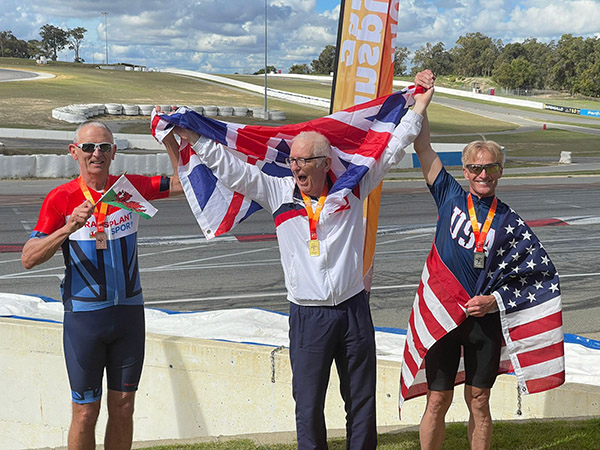
Michael (centre) on top of the world, down under!
But it was worth it: I won a gold medal in the 10km time trial and a bronze medal as part of the GB team in the 20km mixed team time trial, also finishing sixth in the 30km road race.
However, for me the best part of the Games was that they serve as a reminder of just how incredible a gift organ donation is, how amazing and transformative transplants can be and how lucky we are that someone took that momentous, selfless decision one day to donate their organs.
These things all came to a tremendous crescendo at the opening ceremony. In the same way they had done in 2017 in Malaga when I realised that I’d been so caught up in my recovery and training that I’d never really thought about the enormity of what I had gone through. Suddenly, in a bull-fighting arena in Malaga, the very symbol of machismo, it hit me like a sledgehammer and I just sat there quietly amidst all the cheering and joy, tears streaming down my face.
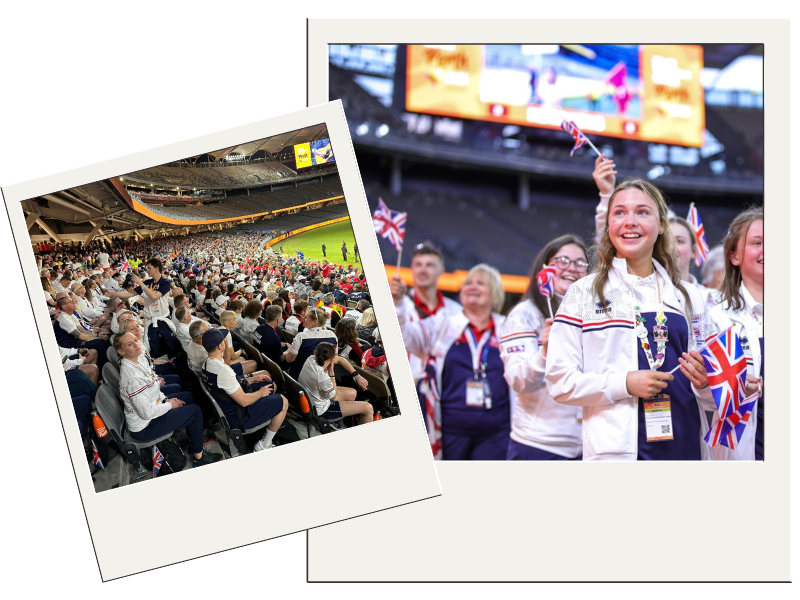
The Games in Perth were no different. Putting several thousand transplant recipients together in a stadium creates a wonderful melting pot of emotion and gratitude so that, when the living donors and donor family members entered the stadium, the taps opened up once again; and I know I was not alone.
We watched a band whose lead singer wrote a beautiful, moving song about organ donation, as her brother had recently passed away and become a donor. It was her first time performing the song for us.
The tears flowed then and at the closing ceremony when she sang again… Like I said, a melting pot of emotion.
But the overwhelming emotion, which runs through the Games like a stick of rock, is gratitude, to donors and donor families and for the opportunity of a second chance at life.
Wherever you are on your personal PKD journey, I hope it is comforting to know that, eventually, good, amazing, joyful things can come out of having PKD."
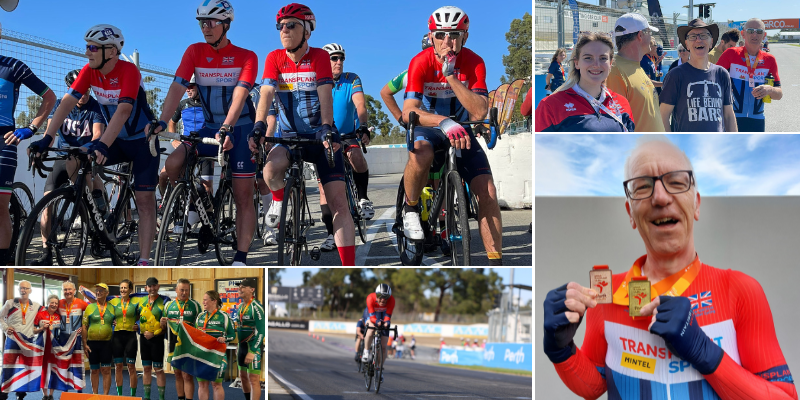
Stay up to date with PKD Charity events, patient stories and research news as it happens.
